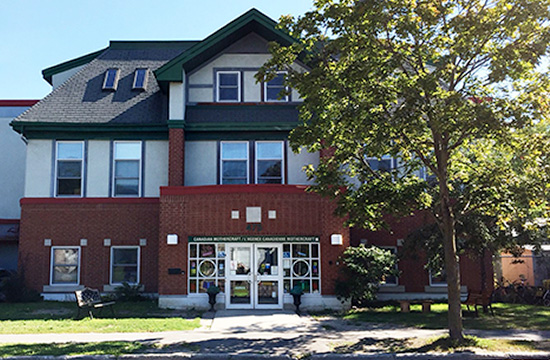Junior Preschool Program
Full Time Junior Preschool Program
Our Junior Preschool Program welcomes children aged 2.5 to 3.5 years, with a maximum group size of 16 children.
Our curriculum is based on learning activities that are inspired by the interests of the children.
One part-time and two full-time Educators facilitate the program and help support and encourage the juniors as they play, learn and grow. Some areas the juniors will explore in the program include art, storytelling, science, math and more. We offer a basic introduction to the French language through songs, games and stories. We also explore our community by enjoying walks through our beautiful neighborhood and visits to the parks. Along the way, we talk about the things we encounter and bring ideas and artifacts back to our room to explore.
Additionally, our juniors learn from their Senior Preschool buddies during regular interactions throughout the day and time spent together in the play yard.
The core values underlying our Junior Preschool Program
Learning Environment for Fostering Developmental Growth
Play is more than just “fun” for preschoolers. It’s how they learn.
Our program is designed specifically to encourage your child to learn through play. The room environment allows for exploration with many materials and activities such as sensory materials, creative/art mediums, building blocks of all kinds, dramatic play props, puzzles and games, books and so much more…
Throughout our curriculum and the play environment we incorporate the four developmental domains of ELECT (social, emotional, cognition and communication, language and literacy), as well as the four foundations of How Does Learning Happen (belonging, well-being, engagement and expression).
Our daily activities are designed to foster:
Language Development
Language Development Goals:
- To comprehend more complex directions and instructions
- To use clear and structured 5+ word sentences
- To expand vocabulary recognition (day to day vocabulary and concept related vocabulary)
- To be able to express needs and interests (I am hungry and etc.)
- To ask relevant questions
Social Emotional Development
Social Emotional Development Goals:
- To practice cooperative play (e.g. turn taking and working together)
- To explore dramatic play in order to understand the various roles in society (Role Play)
- To gain an appreciation for other’s feelings and emotions
- To build self-regulation skills (understanding that your actions affect others)
- To continue developing a sense of self-worth and identity
Physical Growth
Physical Growth Goals:
- Continued development and control of fine motor movement (manipulating writing materials, blocks, small beads etc.)
- To gain body control and balance (riding larger toys, running, jumping and climbing with balance)
- To practice hand-eye coordination (puzzles, printing)
- To be able to dress themselves with little assistance (for the day as well as outdoor clothes and shoes)
- To master meal time skills (staying seated in the chair, using appropriate utensils etc.)
- To practice and master toilet learning
Cognitive Development
Cognitive Development Goals:
- To be able to retain new information (understanding of new concepts such as weather, days of the week, seasons, months)
- To develop letter and number recognition (recognize the letters from their name, recognize every letter from the alphabet)
- To develop and increase attention span and task orientation skills (circle time)
- To learn new concepts such as colour, shape, size, opposites etc.
- To practice decision making skills in a safe environment (deciding where to play, who to play with)
- To develop problem solving skills (puzzle’s, cooperative games)
Need more information about the program?
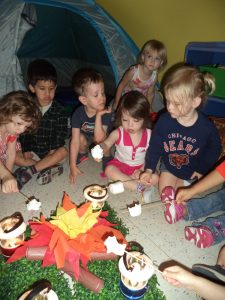 In our program, we follow How Does Learning Happen? Ontario’s Pedagogy for the Early Years and the Ontario government’s early learning framework, ELECT (Early Learning for Every Child Today).
In our program, we follow How Does Learning Happen? Ontario’s Pedagogy for the Early Years and the Ontario government’s early learning framework, ELECT (Early Learning for Every Child Today).Our curriculum is developed on a weekly basis and is continually updated throughout the week. We consider it a living document because we are always taking cues from the children’s interests in determining which way our programming will go. An interest may last for weeks at a time and continue to be explored through different activities and mediums before it is time to move on, or may last only a day or two before the children lose interest and are ready to take a different path. The curriculum plan is posted outside of our classroom on the Parent Info Board.
We are very excited to offer our children an introduction to the French language twice a week with our center’s French Teacher. We want to spark the children’s’ interest in the French language and prepare them for increased exposure to French as they move through our programs. Our French program is a basic introduction of vocabulary and concepts that is enjoyed through songs, stories, and games.
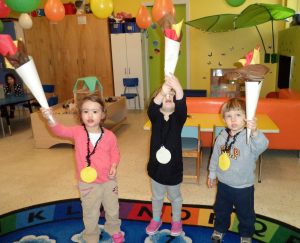 There are 3 scheduled, planned visits to the bathroom each day but of course the children can use the bathroom whenever the need may arise. As with all developmental milestones, toilet learning happens at different times for everyone. Some children come to the Junior Program already diaper free. Together with our families we work patiently with the children when they show us that they are ready to leave the diapers behind. As the children are mastering this skill, we ask that parents bring LOTS of extra clothes and shoes that are easily washable as accidents do happen!
There are 3 scheduled, planned visits to the bathroom each day but of course the children can use the bathroom whenever the need may arise. As with all developmental milestones, toilet learning happens at different times for everyone. Some children come to the Junior Program already diaper free. Together with our families we work patiently with the children when they show us that they are ready to leave the diapers behind. As the children are mastering this skill, we ask that parents bring LOTS of extra clothes and shoes that are easily washable as accidents do happen!We have lots of different tips and tricks and look forward to working with you as your child takes this exciting step.
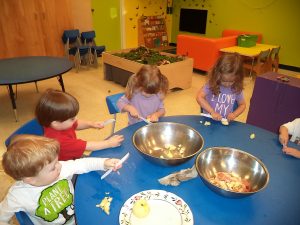 We provide morning snack, lunch and afternoon snack prepared by our professional cook. She has put together healthy, delicious menus that follow the Canada Food Guide. The children are encouraged, but not required to try all foods offered to them. They are expected to sit in a chair for meals; drink from open-faced cups and are encouraged to use appropriate utensils. The Educators eat with the children to model good eating habits and table manners. The children are expected to be able to feed themselves and gain independence by asking for more of what they like, and scraping and putting away their own dishes. Morning snack is open-ended so the children can decide if they would like to sit and eat, while for lunch and afternoon snack the children are expected to sit at the table. Meals are a lovely time for socializing with peers, sharing stories and reflecting on the day we have had together. Our menu plan is posted just outside our room on the Parent Info Board.
We provide morning snack, lunch and afternoon snack prepared by our professional cook. She has put together healthy, delicious menus that follow the Canada Food Guide. The children are encouraged, but not required to try all foods offered to them. They are expected to sit in a chair for meals; drink from open-faced cups and are encouraged to use appropriate utensils. The Educators eat with the children to model good eating habits and table manners. The children are expected to be able to feed themselves and gain independence by asking for more of what they like, and scraping and putting away their own dishes. Morning snack is open-ended so the children can decide if they would like to sit and eat, while for lunch and afternoon snack the children are expected to sit at the table. Meals are a lovely time for socializing with peers, sharing stories and reflecting on the day we have had together. Our menu plan is posted just outside our room on the Parent Info Board.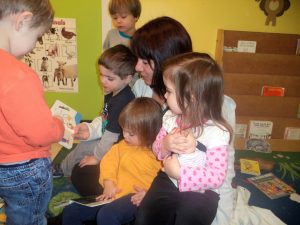 The need for rest and sleep varies greatly at different ages and even among children of the same age; however, rest is an important part of the day for all children. In our program, children are not required to sleep but are encouraged to rest quietly on their cots. Families are asked to bring a blanket from home and a soft sleep toy is always welcomed. The children are helped to settle on their cots after lunch. Sometimes just sitting beside a child is all the help that is needed and sometimes we will offer the calming touch that will help the child relax and calm their body. Each child is different and we respect their individual need for sleep.
The need for rest and sleep varies greatly at different ages and even among children of the same age; however, rest is an important part of the day for all children. In our program, children are not required to sleep but are encouraged to rest quietly on their cots. Families are asked to bring a blanket from home and a soft sleep toy is always welcomed. The children are helped to settle on their cots after lunch. Sometimes just sitting beside a child is all the help that is needed and sometimes we will offer the calming touch that will help the child relax and calm their body. Each child is different and we respect their individual need for sleep.The children who rest for shorter times enjoy a quiet yet engaging Wakers’ Program where quieter activities are provided. The children who have not woken on their own by the end of rest period (3:00 pm at the latest) are gently woken. We appreciate that some children take longer to wake than others and love the opportunity to give cuddles at this time.
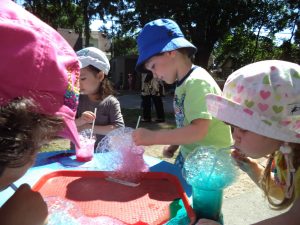 We are outside twice a day, in the morning and in the afternoon, for about an hour each time.
We are outside twice a day, in the morning and in the afternoon, for about an hour each time.Our yard is designed for many types of play such as climbing, performing on the stage, playing in the sandbox and using their imaginations. We have many outdoor toys to foster physical development such as balls, ride-ons, hula-hoops, pylons, sleds, shovels, and wagons.
We especially love water play in the warm summer months, walks around the neighbourhood or visiting Clare Park. When it is too cold in the winter or too hot in the summer, we have the luxury of a gross motor room at our disposal. This allows us to burn off energy using our big muscle groups with activities such as ride-on toys, balls, tumble mats, and dancing.

| 7:30 | Program opens/Free play, prepared learning centres |
| 8:30 | Morning snack is offered |
| 9:00 | Bathroom routine |
| 10:00 | Dressing for outdoor play |
| 10:15 | Outdoor play (Fridays come in @ 11:00 for French) |
| 11:15 | Changing for indoor play, bathroom routine, hand washing |
| 11:30 | Circle time (Fridays French 11:15-11:45) |
| 11:45 | Lunchtime |
| 12:15 | Clean up, bathroom routine |
| 12:45 | Settle on beds |
| 1:00 | Rest Period |
| 2:30 | Wakers’ bathroom routine |
| 3:00 | Circle time |
| 3:15 | Snack offered |
| 3:30 | Bathroom routine, hand washing |
| 3:45 | Dressing for outdoor play |
| 4:00 | Outdoor play |
| 5:15 | Children prepare for pickup |
| 5:30 | Program closes |
Routines and consistency are important for the children however we are always ready for unexpected changes and events.
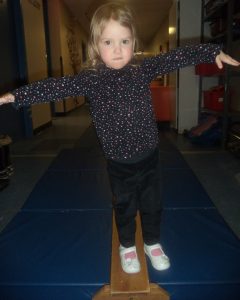 In order to ensure a successful and comfortable day we ask that parents provide the following:
In order to ensure a successful and comfortable day we ask that parents provide the following:
- Appropriate seasonal outdoor clothing
- Three complete extra sets of clothing (shirt, pants, underwear, socks)
- 1 Pair of outdoor shoes (flip flops are not encouraged)
- 1 Pair of indoor shoes
- Sunscreen (Parents are responsible for applying sunscreen at home in the AM, the Educators reapply in the afternoon)
- Seasonal hat
- Diapers/pull-ups, wipes, and diaper cream if required
- Blanket for sleep time, one sleep toy if desired
- Spill-proof water bottle that is easy for your child to manipulate on their own


